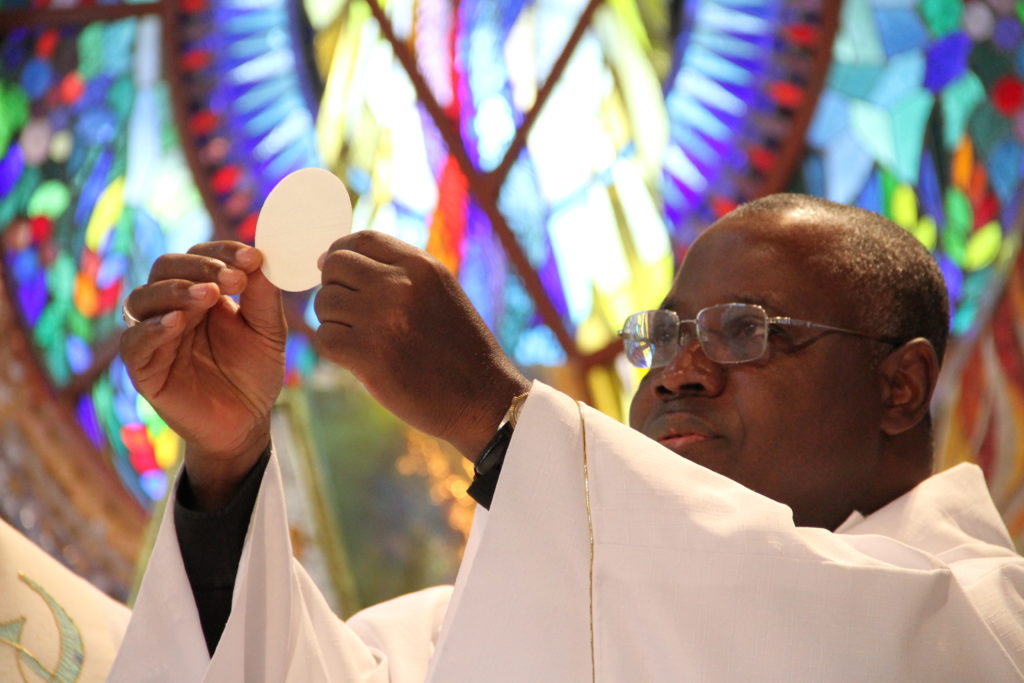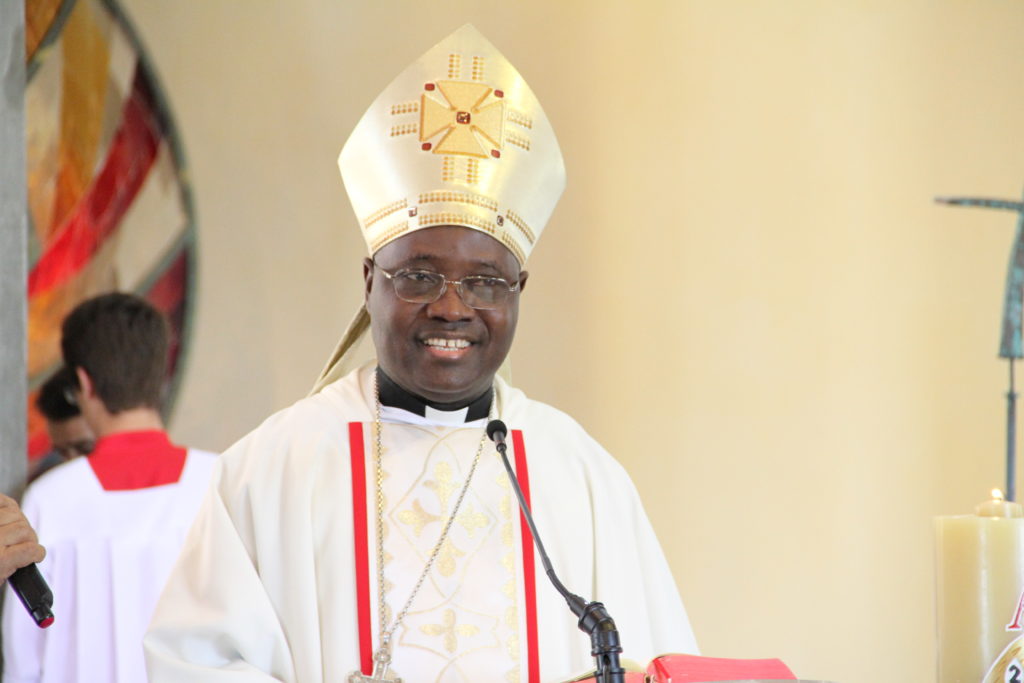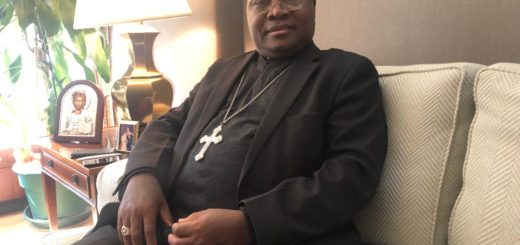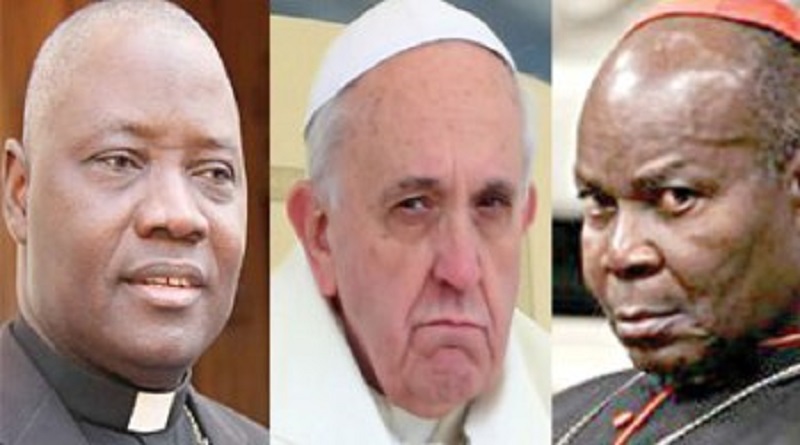“THE JOURNEY OF MY EPISCOPAL LIFE”
This Interview was conducted in July 2015, on the 20th Episcopal Anniversary of His Grace, Most Rev. Ignatius Kaigama.
How did you feel when you learnt you had been chosen to be consecrated as Bishop?
Well, my whole ambition to serve the Church was first to be an altar boy and having been an altar boy, another ambition was to become a Priest and by the grace of God, I became a Priest. I thought that was the highest office I would ever occupy in life and I did my work as a Priest with great joy and contentment until I was told one day that the Holy Father had appointed me a Bishop after a rigorous process of selection. It was the most shocking event of my life. I was called to the Apostolic Nunciature then in Lagos. The news was given to me and I became completely speechless. I thought they had made a mistake; I told the Nuncio to find out if it was my name or some mistake was made. He said, ‘you are the one’. Even when he asked me to go and come back for lunch, I was walking on the street and my steps were unsure because I thought I could collapse any moment. I came back for lunch and did not even feel the taste of food. That was it. The fact was, I had become a Bishop, it was in obedience to the Holy Father and then, there was no way of saying no. It had to be that way.
Can you recall the state of your mind on the day of your consecration?
Again, it was like stepping into another world; a world of uncertainty. You remember that no Bishop goes through a formal training to prepare him for the Episcopal office. It is assumed that your Priestly training is adequate and then, being a Bishop involves not only praying for people and blessing them, it also involves administration, human relationship and so many things. It’s like you train as you go along. It was a bit frightening even though there were many people gathered who wanted to rejoice and celebrate the event. There was an internal upheaval. Would I be able to carry the whole responsibility? Am I adequate? Am I worthy? There were many older Priests and I was now to be their superior. How would I cope with that? I thought. There was a lot of anxiety on how to even commence the work of a Bishop but I trusted in the grace of God because as they say, God confers the grace of office. That was how I stepped into the arena. It was the football stadium in Jalingo, very hot, I remember, it was very very hot and as we processed to the Altar, there were few drops of rain and I knew it was perhaps a blessing from the Lord assuring me that I was not alone.
Summarily how has the journey been so far?
The journey of the Episcopal life, 20 years has been very mixed. This is an office I neither desired nor applied for. It just came upon me and I have to learn in the process. It’s not been very easy, some moments are joyful but I tell you it’s an uphill task because one ends up doing everything. Everything is centred on your person; people do not understand that that we are all co-responsible in this mission. The Bishop suffers a lot because everything centres on him. I’ve been trying to explain to people that there should be division of labour; the lay people, the religious, the Priests have what they can do. But unfortunately, people tend to concentrate all on the person of the Bishop and it makes the whole work cumbersome. You also need a lot of struggle- personal prayer and commitment to be able to respond adequately to the Episcopal demands.
Do you have any fond memories?
The memories I have are of supportive people, surrounding me, even considering my inadequacies. People, really offering to help. People, being there for me. It is a difficult, challenging and lonely mission but I am happy that all those I have worked with have been quite supportive and that makes the load lighter. I just returned from a Pastoral visit recently, and I told the people that when I look at them, I feel invigorated because they are so supportive. I called a meeting of Chairmen of parishes and they came in big numbers; these are the things that make me feel good. Despite the pressure and the burden one carries, despite the multidimensional things that try to weigh one down in the process of this work, I still believe it is a very noble and great work. It’s a privilege to be a Bishop.
Describe a typical day in your life as Archbishop

The first thing I do is get myself prepared to meet Jesus in the Holy Eucharist. If I don’t do that, my whole day has not started. Only when I have celebrated Mass, had some time to meditate, prayed the Divine Office, would I feel normal. I ask God to take control of the rest of the day. That is where I gather energy. So, with all the weight and challenges of this work, this is the secret to carrying on. I believe that when you start your day with Jesus, stay in regular touch with Him during the day and also end the day with Him, it makes a great difference. My day is about prayer, work and prayer because that is the only way to survive.
Your motto is ‘Per Crucem Ad Dei Gloriam’. What inspired it and how has it helped your ministry?

When I was told I had been appointed a Bishop, I thought to myself: I didn’t like it, I never dreamt about it. I returned from the Nunciature in Lagos and we were having a retreat for Priests in Yola. I had to carry the burden alone because if you are told you had been appointed a Bishop, you don’t tell anybody until it is officially announced. We shared the same room with my friend, I couldn’t tell him, I couldn’t sleep at night and I waited for the days to come quickly so it would be announced and I could be relieved. So, it wasn’t easy. With that feeling, when I was to choose my motto, I said, this is going to be a journey of the cross, resembling the journey to Calvary. It’s not going to be fun at all. I decided that the cross would be my motto and through it, I would come to victory and the glory of God. I would have to meander through the challenges and many difficult tasks, suffering incomprehension and misunderstanding, and after these and all that comes with the work, in the end, God will be glorified. Since Jesus was able to fall and suffer many times but still reached His glory, I believed this is a mighty cross but I would carry it. I know I will fall, I know I will need help. There are many Simons of Cyrene, many Veronicas, many men and women ready to support and I decided, I will go. This is the cross, I carry and I believe that through this cross, joy, happiness, grace, many things and above all the glory of God will come.
Looking back, do you have any regrets?
I have always wanted to be a Priest working in the villages. Since my ordination, I was always sent to very poor rural areas and that was my joy. I spent 3 years in a place called Jangbunu and for the 3 years I was there, nobody visited me, no Priest went near there because it was so inaccessible; the roads were bad, you had to park your car at a distance and climb up the mountains, you had to go on foot most of the time. But I enjoyed it, the people were lovely and simple. Even when I was in Rome for studies, my burning ambition was to return and go up the mountains and do my work. Unfortunately, even before I completed my studies, the Bishop had already assigned me to the Cathedral which was for me very upsetting. From there I got called to be a Bishop. If I have any regret, it would be, not being able to do my Priestly ministry with the grassroots that I wanted to identify with. Even though as a Bishop, I can still do that, it is not as I would have loved to because there are many other tasks that won’t give me the freedom to go and stay with the people in the loneliness of their villages. Well, I still hope that someday, maybe when I retire, I will be able to return to some bush or village to work with the rural people. Let’s see what the Lord does.
What do you wish people knew about the Episcopal Office?

All that glitters is not gold. People respect you, give you great honour, give you gifts but that is not all. There is a lot to do as a Bishop. First of all, you have your internal pressures and crises to deal with. You have to be solid, you have to be strong and this needs some efforts. And then, unfortunately, people equate our work with government work. Nowadays, because you are a Bishop, people see you a big man. They are making a mistake. For God’s sake, this work is all about service. People should know that. Some who are ignorant see it as a chieftaincy matter; they feel you are high up there and they want themselves or their relations or tribesmen in that position. If only they know the implications of being a Bishop, they will run if they are asked to take the office. People should know that it’s all about service, self giving and being others centred rather than self centred. If you know what it means to give and give selflessly, then you know that this is a tough job.
You have been renowned as a veteran in dialogue and peace building both on local and international fronts. What has been your driving force and have there been any challenges?

I am a Catholic and the word Catholic means universal. That demands that you embrace everybody. I have always told people that Jesus died with His arms stretched out- a sign of welcoming everybody. With that conviction, I go on to see every human being as made in the image and likeness of God. I see every human being as my blood relation. Be you Buddhist, Muslim, Juju worshipper, Christian of any denomination, you are my real brother or sister. My father who was not a Christian in his early days taught me how to receive people. In our house, there were so many people who came from different tribes; people rejected, abandoned and called names because they were either thought to be bad people or antisocial. My father brought them all in. He would ask me to lead them to the room, bring water for them, give them food and even though I couldn’t speak their language, the lesson for me was that everybody matters. Everybody is dear to God and should be dear to you. So, that has been my inspiration to be open-minded, to embrace everybody. I feel sad when people are locked in in their own world. From the beginning of my life, up to my Priestly ordination, I try to be friends to others, especially those who are not of my tribe or religion. As a young Priest, I had so many Muslim friends. Dialogue for me is absolutely important. If we have to have a peaceful world, we need to reach out to others and keep talking. Problems are inevitable, challenges come, prejudices and misunderstandings will be there, but with dialogue, we can dispel all of them. But when you are locked in in your narrow world, you imagine the worst about your neighbour and this is a fertile ground for breeding violence, vices and destruction.
You were recently re-elected President of the Catholic Bishops Conference of Nigeria (CBCN). What has been your experience and what do you hope to achieve the next three years?
We don’t have a manifesto and I didn’t have to campaign (laughs). So, my mission is to be able to serve the Church in Nigeria through the CBCN. I was elected for a 3-year tenure and I told everybody who cared to listen that I had done my part and should be allowed to go. Surprisingly, during our last plenary, I was re-elected. Very grudgingly, I had to accept since it is a call to service. Whereas in the political or civil setting, you see people running for office and doing everything possible to get there, in our own cycle, at least in the CBCN, I know Bishops who will run far away from this position because they know it entails a lot of service and sacrifice. It’s about giving, pouring out yourself, your life for others. There is nothing to get in terms of material benefits. I keep telling people, even other religious circles and Churches have special systems where their leaders have housing, transportation, facilities, Personal Assistants to help them here and there but the President of the CBCN doesn’t have any of these. I go to Abuja, I have to pay my bills to stay in the Pastoral Centre, I drive my own car, I use my own driver, I use my own Secretary to do all the work I do for the whole of Catholics in Nigeria. So, you can see, it is not something attractive. There’s no salary involved. It is difficult but rewarding in the sense that you feel satisfied with the fact that you are giving something. So, I thank my brother Bishops for having the confidence in me and entrusting me with this responsibility. With every sense of humility, I try to do my best, try to get them working together in unity and I try to map out strategies that would enhance the growth of the Catholic Church in Nigeria.
What are your hopes for the future?
That we live well, peacefully and happily; that we continue to talk, to dialogue. I hope that we continue to be sensible just like we demonstrated in the last elections; the President of the Country was sensible by conceding defeat even before the votes were announced, the President-elect was also magnanimous enough to embrace him on a sensible level; not with bitterness and antagonism. And then that we want to see a new Nigeria. You know, we have suffered enough; the crises, the violence, the destruction of lives and properties. These are needless and unnecessary. We want to see young people in Nigeria aspiring to the highest goal- they can do so because there is justice and fairness. We want to see a Nigeria where elections are conducted and only those who win win, and are allowed to lead; where there is work available, admission to the Universities and higher institutions and merit is uppermost. I think we just need to calm down, re-strategize, re-orientate ourselves and do things in a new way. This finger pointing is not necessary. The young, the old- the men and the women, we all have our faults and we need to address them. We want to change Nigeria? Everyone must begin with himself or herself.




